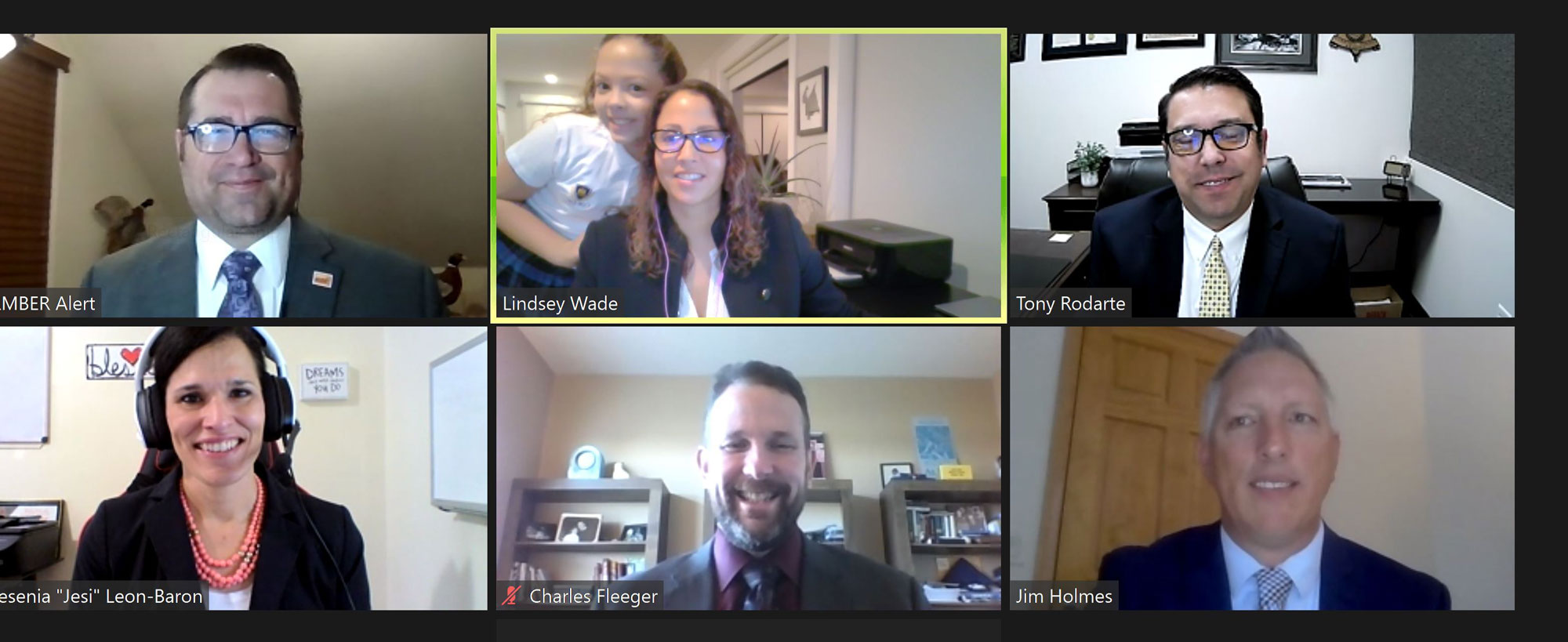AMBER Alert Training During Covid-19
Virtual training keeps the mission of the AMBER Alert Program alive amidst the COVID-19 pandemic

AATTAP offers virtual, instructor-led live training through virtual platforms to ensure child protection professionals’ needs are served.
A law enforcement officer from Arizona engages in a highly involved conversation with another officer from Washington about an ongoing child abduction case. An Idaho therapist and a New Jersey prosecutor weigh in during a breakout training session in which the best approach to bring the child home safely is discussed.
Across multiple disciplines such as law enforcement, child advocacy and social services, these professionals are taking part in the latest virtual, instructor-led live training (VILT) opportunity offered by the AMBER Alert Training and Technical Assistance Program (AATTAP).
Across states, time zones, and various ‘work environments’ (home office, kitchen table, and bedrooms-turned office) created by stay-at-home and physical-distancing precautions, interactive training through virtual collaboration platforms such as Zoom is proving to be an absolute lifeline. Virtual training events are helping to maintain and improve knowledge and skills, despite the inability to gather in person for classroom-based training.
In response to pandemic-driven shutdowns and travel restrictions, AATTAP began developing VILT courses based on current classroom curriculum, with its first virtual training delivered in early fall 2020.
AATTAP’s self-paced eLearning courses, available for 24/7 access via the National Criminal Justice Training Center at Fox Valley Technical College’s (NCJTC-FVTC) Blackboard online learning platform, were already in play and very popular with law enforcement and public safety professionals across the country. An information campaign was ramped up in early spring 2020 to boost awareness of those offerings and to ensure training and resource sharing continued uninterrupted as the challenges of COVID-19 emerged.
During the 4th quarter of 2020, ten VILT events were offered across three courses:
- Child Abduction Tabletop Exercise (CATE) scenario-based training;
- Community Response to High Risk Missing Victims; and
- Initial Response Strategies and Tactics When Responding to Missing Children Incidents.
Additional course offerings are already in development for 2021.
Evolution in Training
For more than 16 years, the U.S. Department of Justice, Office of Juvenile Justice and Delinquency Prevention (OJJDP) has been offering AMBER Alert training to tens of thousands of child protection professionals through FVTC with a focus on in-person teaching—until now.
“For obvious reasons, in-person training, conferences and meetings were impacted early on,” said Jim Walters, AATTAP Program Administrator. “This required a change in our business processes. One thing hasn’t changed: we are still working to improve the way we all do what we do to safely recover an abducted child.”

AATTAP Program Manager Byron Fassett has coordinated the addition of VILT courses by leading specific subject matter project teams. He notes how the first course delivered via Zoom concerning high-risk missing victims was ultimately as much of a learning experience for the instructors as it was for the students.
“We used it as a trial to see what is needed to convert the curriculum to an online environment,” said Fassett. “We also had to help our instructors to engage with students so we could make it as close to a classroom setting as possible. We have had to think outside the box, not letting the virtual delivery method limit us.”
The addition of VILT courses makes it possible for participants to better engage through discussions around polls, breakout rooms, and other interactive activities, with the ability to hear others’ voices and see facial expressions. This approach offers added learning and practical application benefits beyond the more passive ‘watch and listen’ framework of traditional webinars.
Noting the importance of this level of engagement through virtual training, Fassett added “I can read people’s faces. I can engage people very easily within a classroom environment.
People retain some information from the spoken word, but they are better at recalling instructions when they can see an instructor’s delivery and movements.”
The instructors, moderator, and behind-the-scenes support team, comprised of AATTAP staff and associates, utilize pre-event ‘full dress rehearsals’ to ensure no aspect of the live event administration goes untested beforehand. The entire team also meets after each event to carefully review and discuss what did and did not work, making sure improvements are made for future training events.
“We need to make sure the classes work for everyone because we have such a diverse mix of law enforcement officers, social workers, teachers and other professionals,” added Fassett.
Modifying Courses

AATTAP Associate and Region One Liaison Yesenia ‘Jesi’ Leon-Baron uses her years of experience as a special agent for the Florida Department of Law Enforcement to offer real-life examples for the multidisciplinary groups during VILT events. Leon-Baron and other instructors have a clear understanding that students likely have more distractions at home than they do in an actual classroom training environment.
“You have to be energetic and engage the class,” said Leon-Baron. “This is such a hard situation for all of us, especially for somebody who has been in front of the computer all day doing other things with work or other meetings. We have to make sure our training is worth their time and give them the opportunity to gain knowledge and grow their skill sets to help vulnerable children.”
The VILT courses are delivered in both single and multi-day formats, offering child protection professionals options which best fit their demanding and varied schedules during these unprecedented times. The events reference and offer access to digital resources that can be used during and following the training.
During the event, visual training materials focus on a clean, conceptual design which delivers key information while not overwhelming participants with details, allowing them to focus on the instructors as well as having a discussion with other participants.
Students can speak up or use the chat function on Zoom to make comments or ask questions. Instructors also remain online for a bit following each session to address additional questions or comments not covered during class.
As with AATTAP’s in-person training, the VILT courses offer instruction, case study examples, and interactive scenarios delivered by subject matter experts as well as family members who have experienced the tragedy of a child abduction and/or exploitation. AATTAP CART Program Coordinator Derek VanLuchene fits in both of these important categories.
In 1987, when VanLuchene was 17 years old, his eight-year-old brother Ryan was abducted and murdered by a repeat sex offender. VanLuchene went on to become a supervising agent for the Montana Department of Justice, and he continues to work tirelessly as an advocate for missing and abducted children and their families.
VanLuchene coordinates the Child Abduction Response Team (CART) classroom and VILT trainings, as well as the Child Abduction Tabletop Exercise (CATE) courses.
“We expect everyone to interact in these virtual courses, just as they would in the classroom,” said VanLuchene. “In one of our tabletop scenario exercises, we present a case where a girl goes missing from a park. Her parents report her missing and initial officers respond. What do you do next in your investigation? What are the steps you need to take in that investigation?”
Because of their strong use of breakout room discussions, the CATE VILT course is held to a slightly smaller class roster, with around 50 participants per event. The breakout groups optimize multi-agency and/or discipline discussions and groupwork. Instructors visit each room to answer questions and facilitate communication between people who may be meeting one another for the first time through the virtual training.
Overcoming Reservations

VanLuchene said some participants have told him they were skeptical an online tabletop exercise like this was sufficient to support the preparation and readiness needed for a complex law enforcement and child protection response. However, students are reporting their early reservations about the effectiveness of virtual courses were unwarranted.
Here are some examples of the feedback from participants:
- “Highly effective delivery through the online platform; really exceptionally done. Far better than any other experiences I’ve had.”
- “Very professional online training. I enjoyed the breakout sessions where we were able to collaborate and discuss resolutions to the incident.”
- “This was the best virtual training I have been to so far; it was engaging and informative. I enjoyed it.”
- “The instructors provided great information. I really enjoyed the diversity of individuals attending and professional background during the breakout sessions and having [the family perspective presenter] tell her personal story was very powerful.”
- “The web-based format is a great time saver.”
AATTAP eLearning, Publications and Digital Collaborations Coordinator Bonnie Ferenbach expects the VILT courses will continue beyond pandemic-related travel and in-person event restrictions, noting the importance of continuing work to develop additional VILT offerings toward an expanded array of training options. Even as travel and classroom training resumes, she emphasized AATTAP’s commitment to delivering training both in-person and web-based formats.
“Increasingly, adult learners working in demanding realities need and expect options in how they receive training, including both self-paced ‘anytime-on-demand’ courses, as well as live webinars and interactive virtual instructor-led offerings.”
As the AATTAP team continues work on expanding the VILT course catalog alongside its self-paced eLearning courses, Ferenbach emphasized “When developing the curriculum for virtual classes, we are careful not to assume that what works in the classroom will make a one-to-one transfer to online instruction.”

Noting the incredible efforts and ongoing hard work of the AATTAP team, she added, “We have an amazing team, with each member embracing an ‘all hands on deck’ mindset, to develop, test, deliver and continuously improve, with an eye toward meeting what is sure to be a continued and increasing demand.”
This trajectory is based on clear evidence that was evolving pre-pandemic, and which has only been increased through stay-at-home restrictions and financial hardships across the nation; online learning is turning out to be the only way most organizations can obtain essential training and continuing education. And even as pandemic restrictions subside, many agencies and jurisdictions simply do not have the personnel bandwidth, time, or budgets for time off and travel to participate in classroom training.
As of January 2021, AATTAP had 10 additional VILT events scheduled to date, with more than 800 registration requests received. Additional courses on other topics are being added monthly.
“As these new classes are approved for delivery, we have seen rosters fill quickly, with waiting lists and requests for more training topics,” said AATTAP Program Director Jim Walters. “Our team will keep developing and refining these new learning options while preparing for the time we can get back into the classroom.”
Registration and additional information about AATTAP learning opportunities can be found here.
